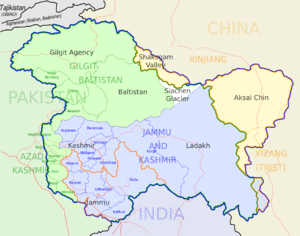Ministry of Kashmir Affairs and Gilgit-Baltistan
The Ministry of Kashmir Affairs & Gilgit Baltistan (Urdu: وزارت امور کشمیر و گلگت بلتستان, abbreviated as MoKGB) is a ministry of the Government of Pakistan. The Ministry looks upon affairs of Azad Kashmir and Gilgit Baltistan as both territories of Pakistan administered Kashmir do not have regular provincial status of Pakistan.
| وزارت امور کشمیر و گلگت بلتستان | |
 | |
| Agency overview | |
|---|---|
| Formed | April 1949 |
| Jurisdiction | Government of Pakistan |
| Headquarters | Islamabad, Islamabad Capital Territory |
| Employees | 173 employees (58 Officers and 115 staff members) |
| Annual budget | 802.69 Million Rupees (2018-19) |
| Minister responsible |
|
| Agency executive |
|
| Child agencies |
|
| Website | www |
History
1949–1974
Ministry of Kashmir Affairs (MKA) was first established in January 1949. Mushtaq Ahmad Gurmani, a Minister of State without portfolio (sic) was appointed as the minister in charge of the ministry. A sprawling office was set up in Rawalpindi with a 300-man secretariat. It also had Directorates for Public Relations, Refugee Rehabilitation, Movements and Quartering, Civil Supplies and Coordination, which were in Murree.[3]
In April 1949 the Ministry executed the Karachi Agreement with the-then president of Azad Kashmir Muhammad Ibrahim Khan and the leader of the Muslim Conference Chaudhry Ghulam Abbas. By the agreement, complete control over the Gilgit and Baltistan areas was handed over to the ministry. For Azad Kashmir itself, control over defence and foreign affairs was ceded to the ministry, including the negotiations with the United Nations and arrangements for the envisaged plebiscite for Kashmir.[3] However, in actual fact, the ministry had almost complete control over the Azad Kashmir government itself, because the government had few resources and it was dependent on Pakistan for all its supplies.[4] Scholar Navnita Chadha Behera states:
In the chequered evolution of Azad Kashmir’s political status, one constant has been the supremacy of the Ministry of Kashmir Affairs (MKA) set up in 1948. Notwithstanding the changing form of government—basic democracy (1960), presidential form (1971), and parliamentary system (1974)—the ultimate authority has always been vested in the MKA.[5]
Scholar Christopher Snedden states:
The joint secretary heading the MKA 'had the best claim to being the real head of the Azad Kashmir government'.[4]
Political analyst Ershad Mahmud states:
There is no denying the fact that, up to 1970, the fate of AJK governments largely depended on the allpowerful bureaucrats of the Ministry of Kashmir Affairs that were the kingmakers.[6]
1974–present
In 1974, under the Government of Zulfikar Ali Bhutto, Azad Kashmir got its first constitution, which was called the Interim Constitution of 1974. The Gilgit and Baltistan areas were separated into a separate unit called Northern Areas, and the MKA was renamed the Ministry of Kashmir Affairs and Northern Areas (MKANA).[6]
In 2009, the Northern Areas were renamed Gilgit-Baltistan and the ministry was correspondingly renamed Ministry of Kashmir Affairs and Gilgit-Baltistan.[7]
Organisation
- Jammu and Kashmir Refugees Rehabilitation Organization
- Northern Areas Transport Corporation
- Directorate of Health Service, AJK
- Directorate of Health Service, Gilgit-Baltistan
- Jammu and Kashmir State Property, Lahore
See also
- Ministry of States and Frontier Regions
- Gilgit-Baltistan Council
References
- "Kashmir territories profile". BBC. 3 October 2017. Archived from the original on 2015-07-24. Retrieved 9 December 2018.
- "Kashmir Fast Facts". CNN. 25 March 2018. Archived from the original on 2018-07-10. Retrieved 9 December 2018.
- Snedden, Kashmir: The Unwritten History 2013, p. 89.
- Snedden, Kashmir: The Unwritten History 2013, p. 90.
- Behera, Demystifying Kashmir 2007, p. 177.
- Mahmud, Ershad (1 September 2006), "Status of AJK in Political Milieu", Policy Perspectives, Islamabad: Institute of Policy Studies, 3 (2): 105–123
- "Ministry officials". Archived from the original on 2016-02-04. Retrieved 2020-04-05.
External links
- "Ministry of Kashmir Affairs & Gilgit-Baltistan". Archived from the original on 2016-02-04. Retrieved 2016-10-19.
Bibliography
- Behera, Navnita Chadha (2007), Demystifying Kashmir, Pearson Education India, ISBN 8131708462
- Snedden, Christopher (2013) [first published as The Untold Story of the People of Azad Kashmir, 2012], Kashmir: The Unwritten History, HarperCollins India, ISBN 9350298988
- Snedden, Christopher (2015), Understanding Kashmir and Kashmiris, Oxford University Press, ISBN 978-1-84904-342-7

